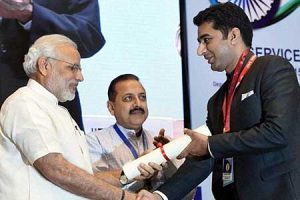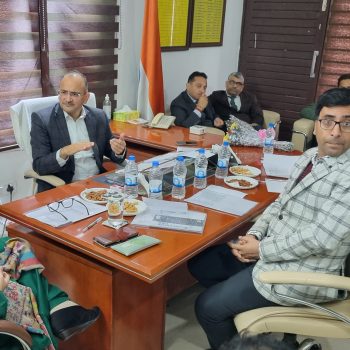Secretary RDD wraps up series of meetings on MGNREGA Convergence and AAP
SRINAGAR, JANUARY 30: Secretary, Rural Development Department (RDD) and Panchayati Raj, Dr Shahid Iqbal Choudhary, who is known for taking robust initiatives is back with with his convergence model to revamp rural infrastructure across Jammu and Kashmir.
Dr Choudhary has received Prime Minister’s award for his remarkable work under convergence model when he was a Deputy Commissioner in one of the districts of Jammu region.
In this regard, Dr Choudhary, who is currently holding a position of Secretary, Rural Development and Panchayati Raj, Tuesday concluded a series of meetings with Assistant Commissioner Development (ACDs) of the Kashmir division.
The focus was on discussing convergence with line departments for creation of public assets, finalization of Labour Budget for the fiscal year 2024-25 and formulating an Annual Action Plan (AAP) for development initiatives in the region.
During the meetings, Dr Shahid emphasized the importance of strategic convergence with other schemes such as NRLM, SBM, PMAY-G, IWMP of the Rural Development Department and other sectors like Agriculture, Forestry, Food Supplies, Forestry, Horticulture and Irrigation department.
The roadmap for the upcoming year was designed to include innovative strategies for enhancing land productivity, improving livelihoods, and reclaiming unused lands.
Shahid Iqbal Choudhary is a 2009 batch Indian Administrative Service officer from Jammu and Kashmir cadre and the current Administrative Secretary of RDD. He earlier served as Secretary, Tribal Affairs Department and Chief Executive Officer, J&K Mission Youth, Mission Director, Skill Development Mission, Jammu & Kashmir. He secured an All India Rank 51 in the UPSC’s Civil Services Examination for the year 2008. Shahid was the first Muslim from Jammu region and first Gurjar from J&K to get into Indian Administrative Service as a direct recruit from IAS.
Highlighting the significance of improving household land productivity, Dr Shahid stressed the need for robust infrastructure for irrigation.
The Secretary placed special emphasis on the promotion of livelihoods through horticulture, sericulture, plantation, and farm forestry.
He urged the development of fallow lands and the inclusion of unskilled wage components in construction projects under government schemes.
Secretary RDD underscored the creation of infrastructure to promote livestock and fisheries.
He referred to successful programs like Mumkin and Tejaswini, suggesting that their experiences could serve as valuable lessons for the Unnati Scheme.
Addressing a critical need, Dr. Shahid urged departments to establish Food Grain Storage Structures in every district to enhance ration storage capabilities.
He advocated a strong focus on public works related to natural resources management, emphasizing water conservation and irrigation.
Secretary RDD underscored the creation of infrastructure to promote livestock and fisheries.
He referred to successful programs like Mumkin and Tejaswini, suggesting that their experiences could serve as valuable lessons for the Unnati Scheme.
Addressing a critical need, Dr. Shahid urged departments to establish Food Grain Storage Structures in every district to enhance ration storage capabilities.
He advocated a strong focus on public works related to natural resources management, emphasizing water conservation and irrigation.
Secretary RDD stressed the importance of creating individual assets for vulnerable sections of society. This involved enhancing land productivity, improving livelihoods, developing fallow or waste lands, constructing houses, and promoting livestock and fisheries.
The Secretary emphasized the need for common infrastructure for NRLM-compliant self-help groups. He proposed the creation of common worksheds for livelihood activities, providing a centralized space for various self-help groups.
In the realm of rural infrastructure, Dr Shahid highlighted priorities such as rural sanitation through soak pits and compost pits, the establishment of food grain storage structures, and disaster preparedness and restoration measures.
The Secretary stressed the need for mutual communication, trust, and commitment among departments to overcome challenges hindering effective collaboration.
The meeting also addressed issues such as social audits, training and skill development programs, geotagging, and the National MGNREGS Management System (NMMS) usage.
Secretary in Rural Development Department, Tariq Ahmad Zargar, proposed initiatives to streamline the convergence plan, rectify funding gaps, and strengthen cooperation among different departments.
He also asked the concerned heads of the districts to address the needs of vulnerable segments of society, and prioritizing Category B works associated with natural resource management.
The meeting was also attended Additional Secretary RDD, Waseem Raja among others.





